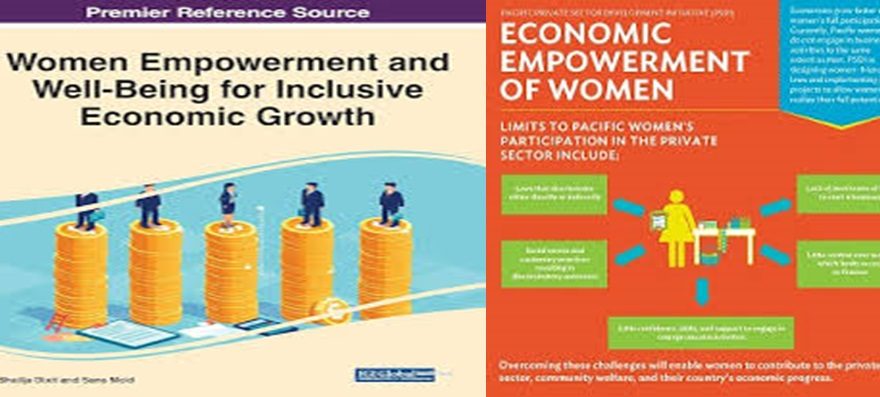
Investing in women can help Ethiopia reduce poverty and; supporting their participation in the economy enables the nation to improve overall family health for they have all the time come to the forefront in the societal strata. Besides, assisting women’s participation in the economy is instrumental in slowing down population growth rates. Since women in Ethiopia have faced many barriers to full and equitable economic participation, including unemployment, low access to resources, and limited admittance to productive capital resources, these challenges have to be well done away with. True, dealing with the major determinants and challenges of women’s participation in income-generating activities needs to be well-focused as they have been considered housewives, and only husbands are expected to participate in high income-generating activities due to the local customs.
Having all these concepts in mind, The Ethiopian Herald approached Yewubdar Teshome, an economist and gender specialist who graduated from Addis Ababa University, to garner professional comments and standpoints regarding women’s contribution to the socio-economic development in Ethiopia.
She said, “Women who are more than half of the population in Ethiopia have not yet benefited out of various socio-economic activities as they have not received due emphasis to do so. However, their role in making a significant contribution to the overall socioeconomic change in the country is really untold.”
“Even though both women and men play different roles and perform different responsibilities concerning the livelihood of their households and socio-economic routines, men have the primary responsibility for income-earning and women have the primary responsibility for the utilization of food and home management in rural households. This is because, in rural areas of the nation, women’s participation in income generating activities is low due to limited access to productive resources like education, health, and training and employment opportunities.”
With limited participation in low-income generating activities, of course, they prioritize their income to cover family expenses, particularly on food items. However, in the twenty-first century, the role of women is not just limited to domestic activities rather they are playing an entrepreneurial role too. In line with this, the access of women to entrepreneurial ventures has widened in most countries which previously conquered by men.
The role of women in income-generating activities is of paramount importance to the economic development of their households. In Ethiopia, however, women are not economically free, especially in rural areas. It is a very rare case that women walk against their male’s decision because they are dependent on their husband’s income. Such a discouraging fashion has to be well altered and women have to be given discretion to undertake a range of activities, she added.
As to Yewubdar, consequently, recognizing the challenges of women and supporting them is crucial and vital for the development or growth of women and the fulfillment of their economic potential. While they are often hidden, silent and not appreciated, rural women represent probably the world’s most powerful untapped natural capital.
Most of the activities in which women engaged in their livelihood strategies are not defined as economically active employment in national account systems, yet are crucial to the well-being of household members.
In Ethiopia, women often face seclusion and exclusion based on the socio-cultural norms of the patriarchy that ultimately limit their access to development and empowerment. Being deprived of the basic legal rights of participation in economic activities, restriction on work outside the home, lack of education and skills, the honor associated with women’s sexuality, domestic workloads, and the lack of awareness about the market make them dependent on their male counterparts.
Under strict patriarchy, only men are considered responsible for fulfilling all the basic needs of their family, and women are supposed to stay inside the houses as primary caretakers for the family’s health and nutrition, bearing and raising children, household management, fetching water and fodder, and fuel wood collection.
In Ethiopia, except for some improvement with the current leading government, the varied and important roles played by women have not always been recognized. The discriminatory political, economic, and social rules and regulations that prevail in Ethiopia have barred women from enjoying the fruits of their labor. The gender aspect in the country is characterized by women having a lower social status compared to men. As a result of the negative effect of culture and tradition, husbands do not permit women to go out and work; if not, they will be considered as turning aside from the norm, she added.
Such a discriminatory circumstance has precluded women from participating in various socio-economic as well as political trends as per their capacity and initiation. The tradition itself has to be modified so as to open rooms for women’s active participation in all aspects.
From a young age, for instance, autonomy is promoted among boys, while girls are not given any independence. In their childhood, girls are trained by their families to be more obedient and dependent, focusing on household chores such as cooking, in preparation for marriage and caring for their households. Besides, due to cultural norms, religious prescriptions, and practices identified for women, their status and role differ which enormously restricts the accessibility of opportunities to women. One of the major reasons that women, or young girls, are not empowered through higher levels of education is the issue of early marriages.
Most importantly, she said, income-generating activity which is one of the mechanisms that can be used to empower women has the potential to uplift them through economic decision-making, increasing their mobility, increasing their access to resources, and control over resources, has to be well embarked on. “Empowering women through income generating activities enhances economic development of their families, society and country, too. Unequivocally, women empowerment and economic development are closely related: in one direction, development alone can play a major role in driving down inequality between men and women; in the other direction, empowering women may benefit development and growth itself,” he opined.
According to Yewubdar, the participation of women in income-generating activities has tremendous potential to empower them. It is a driving force for economic development, job creation, personal development, and self-empowerment.
According to Yewubdar, the participation of women in income-generating activity is a key route to bringing women’s empowerment through increasing their economic development as their economic empowerment is the most important factor that contributes to equality between women and men. True, women’s economic empowerment can be achieved through equal access to and control over critical economic resources and opportunities, and the elimination of structural gender inequalities in the labor market, including a better sharing of unpaid care work.
Here, she further elucidated, that education must come first as it increases women’s understanding and awareness of the situation in which they live and their cognitive and psychological realm of empowerment.
“Definitely, education is a powerful tool to facilitate entry in the business activities, which can enhance the managerial ability of the individual, and hence increase the propensity to participate in income generating activities. Education is a powerful tool to place women in a better position to perceive the potential benefits of adopting new innovations like participation in income generating activities. Educated women are ready to accept every innovation to engage in business activities than the illiterate ones which show education determines women’s empowerment and participation in economic activities.”
Furthermore, access to appropriate financial services is a fundamental condition for poverty reduction, job creation, income security and social protection, she said.
She said, “It is believed that women entrepreneurs perform better in their businesses when they have financial accessibility. This means that women-owned enterprises with access to finance have a chance to maximize profit than credit-constrained women-owned enterprises. Obviously, access to credit can help women participate in different income-generating activities by using it as initial capital. Therefore, there would be a positive relationship between access to credit and women’s participation in income-generating activities thereby prettily backing the economic growth of the nation.”
She wrapped up her idea saying that no doubt, women contribute to economic growth and well-being, and they have to be well supported to make a difference via addressing the potential barriers to participation in the economy through: expanding entrepreneurship, widening access to resources, facilitating conditions to help them extensively use formal banking systems, among others. In so doing, promoting the socio-economic growth in which women can actively partake would be quite fruitful and easy.
BY MENGESHA AMARE
The Ethiopian Herald December 1/2024





